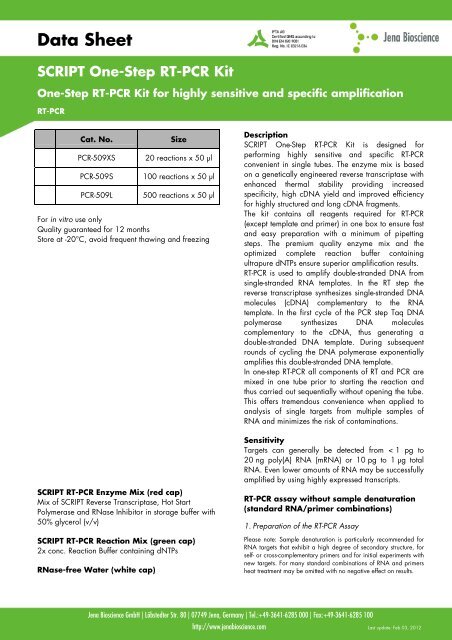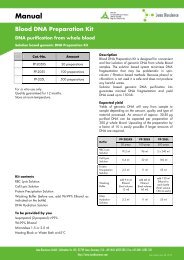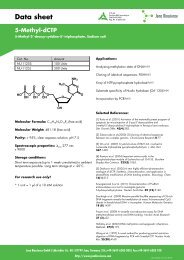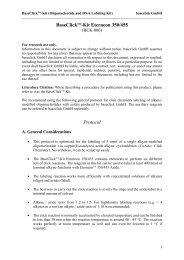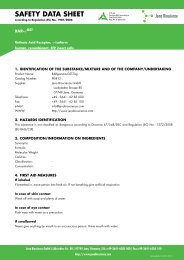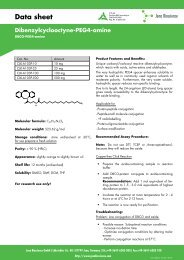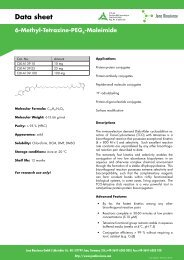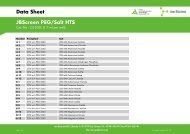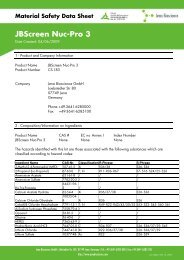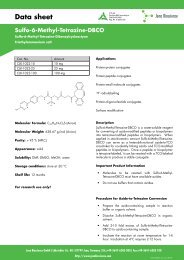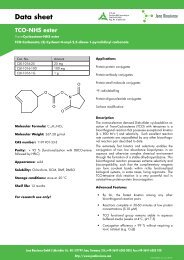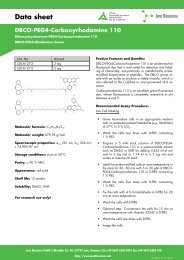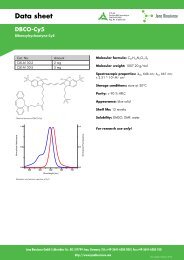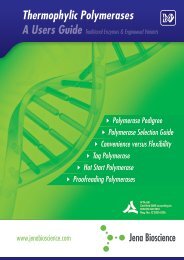Data Sheet SCRIPT One-Step RT-PCR Kit - Jena Bioscience
Data Sheet SCRIPT One-Step RT-PCR Kit - Jena Bioscience
Data Sheet SCRIPT One-Step RT-PCR Kit - Jena Bioscience
You also want an ePaper? Increase the reach of your titles
YUMPU automatically turns print PDFs into web optimized ePapers that Google loves.
<strong>Data</strong> <strong>Sheet</strong><br />
<strong>SCRIPT</strong> <strong>One</strong>-<strong>Step</strong> <strong>RT</strong>-<strong>PCR</strong> <strong>Kit</strong><br />
<strong>One</strong>-<strong>Step</strong> <strong>RT</strong>-<strong>PCR</strong> <strong>Kit</strong> for highly sensitive and specific amplification<br />
<strong>RT</strong>-<strong>PCR</strong><br />
Cat. No.<br />
Size<br />
<strong>PCR</strong>-509XS 20 reactions x 50 µl<br />
<strong>PCR</strong>-509S 100 reactions x 50 µl<br />
<strong>PCR</strong>-509L 500 reactions x 50 µl<br />
For in vitro use only<br />
Quality guaranteed for 12 months<br />
Store at -20°C, avoid frequent thawing and freezing<br />
<strong>SCRIPT</strong> <strong>RT</strong>-<strong>PCR</strong> Enzyme Mix (red cap)<br />
Mix of <strong>SCRIPT</strong> Reverse Transcriptase, Hot Start<br />
Polymerase and RNase Inhibitor in storage buffer with<br />
50% glycerol (v/v)<br />
<strong>SCRIPT</strong> <strong>RT</strong>-<strong>PCR</strong> Reaction Mix (green cap)<br />
2x conc. Reaction Buffer containing dNTPs<br />
RNase-free Water (white cap)<br />
Description<br />
<strong>SCRIPT</strong> <strong>One</strong>-<strong>Step</strong> <strong>RT</strong>-<strong>PCR</strong> <strong>Kit</strong> is designed for<br />
performing highly sensitive and specific <strong>RT</strong>-<strong>PCR</strong><br />
convenient in single tubes. The enzyme mix is based<br />
on a genetically engineered reverse transcriptase with<br />
enhanced thermal stability providing increased<br />
specificity, high cDNA yield and improved efficiency<br />
for highly structured and long cDNA fragments.<br />
The kit contains all reagents required for <strong>RT</strong>-<strong>PCR</strong><br />
(except template and primer) in one box to ensure fast<br />
and easy preparation with a minimum of pipetting<br />
steps. The premium quality enzyme mix and the<br />
optimized complete reaction buffer containing<br />
ultrapure dNTPs ensure superior amplification results.<br />
<strong>RT</strong>-<strong>PCR</strong> is used to amplify double-stranded DNA from<br />
single-stranded RNA templates. In the <strong>RT</strong> step the<br />
reverse transcriptase synthesizes single-stranded DNA<br />
molecules (cDNA) complementary to the RNA<br />
template. In the first cycle of the <strong>PCR</strong> step Taq DNA<br />
polymerase synthesizes DNA molecules<br />
complementary to the cDNA, thus generating a<br />
double-stranded DNA template. During subsequent<br />
rounds of cycling the DNA polymerase exponentially<br />
amplifies this double-stranded DNA template.<br />
In one-step <strong>RT</strong>-<strong>PCR</strong> all components of <strong>RT</strong> and <strong>PCR</strong> are<br />
mixed in one tube prior to starting the reaction and<br />
thus carried out sequentially without opening the tube.<br />
This offers tremendous convenience when applied to<br />
analysis of single targets from multiple samples of<br />
RNA and minimizes the risk of contaminations.<br />
Sensitivity<br />
Targets can generally be detected from < 1 pg to<br />
20 ng poly(A) RNA (mRNA) or 10 pg to 1 µg total<br />
RNA. Even lower amounts of RNA may be successfully<br />
amplified by using highly expressed transcripts.<br />
<strong>RT</strong>-<strong>PCR</strong> assay without sample denaturation<br />
(standard RNA/primer combinations)<br />
1. Preparation of the <strong>RT</strong>-<strong>PCR</strong> Assay<br />
Please note: Sample denaturation is particularly recommended for<br />
RNA targets that exhibit a high degree of secondary structure, for<br />
self- or cross-complementary primers and for initial experiments with<br />
new targets. For many standard combinations of RNA and primers<br />
heat treatment may be omitted with no negative effect on results.<br />
<strong>Jena</strong> <strong>Bioscience</strong> GmbH | Löbstedter Str. 80 | 07749 <strong>Jena</strong>, Germany | Tel.:+49-3641-6285 000 | Fax:+49-3641-6285 100<br />
http://www.jenabioscience.com Last update: Feb 03, 2012
<strong>Data</strong> <strong>Sheet</strong><br />
<strong>SCRIPT</strong> <strong>One</strong>-<strong>Step</strong> <strong>RT</strong>-<strong>PCR</strong> <strong>Kit</strong><br />
<strong>One</strong>-<strong>Step</strong> <strong>RT</strong>-<strong>PCR</strong> <strong>Kit</strong> for highly sensitive and specific amplification<br />
<strong>RT</strong>-<strong>PCR</strong><br />
Add the following components to a nuclease-free<br />
microtube. Pipett on ice and mix the components by<br />
pipetting gently up and down. In general, water, RNA<br />
and primers should be mixed together before the rest<br />
of the components are added.<br />
component stock conc. final conc. 1 assay<br />
<strong>SCRIPT</strong> <strong>RT</strong>-<strong>PCR</strong><br />
Reaction Mix<br />
2x 1x 25 µl<br />
RNA Template 1) 1 pg - 1 µg<br />
forward Primer 10 µM 200-400 nM 1-2 µl<br />
reverse Primer 10 µM 200-400 nM 1-2 µl<br />
<strong>SCRIPT</strong> <strong>RT</strong>-<strong>PCR</strong><br />
Enzyme Mix 2)<br />
RNase-free water<br />
2 µl<br />
fill up to<br />
50 µl<br />
1) 1 ng to 500 ng polyA RNA or 10 ng to 5 µg total RNA<br />
2) <strong>SCRIPT</strong> <strong>RT</strong>-<strong>PCR</strong> Enzyme Mix already contains RNase inhibitor<br />
that is recommended and may be essential when working with<br />
low amounts of starting RNA.<br />
Continue with reverse transcription and thermal<br />
cycling as recommended.<br />
<strong>RT</strong>-<strong>PCR</strong> assay with sample denaturation<br />
(RNA/primer with a high degree of<br />
secondary structure)<br />
Please note: Sample denaturation is particularly recommended for<br />
RNA targets that exhibit a high degree of secondary structure, for<br />
self- or cross-complementary primers and for initial experiments with<br />
new targets. For many standard combinations of RNA and primers<br />
heat treatment may be omitted with no negative effect on results.<br />
1. Preparation of the RNA / Primer Mix<br />
Add the following components to a nuclease-free<br />
microtube and mix by pipetting gently up and down.<br />
component stock conc. final conc. 1 assay<br />
RNA Template 1) 1 pg - 1 µg<br />
forward Primer 10 µM 200-400 nM 1-2 µl<br />
reverse Primer 10 µM 200-400 nM 1-2 µl<br />
RNase-free water<br />
fill up to<br />
10 µl<br />
2. Denaturation and primer annealing<br />
Incubate the mixture at 70°C for 5 min and place it at<br />
room temperature for 5 min.<br />
3. Preparation of the <strong>RT</strong>-<strong>PCR</strong> Mix<br />
Add the following components to a further nucleasefree<br />
microtube and mix by pipetting gently up and<br />
down.<br />
component stock conc. final conc. 1 assay<br />
<strong>SCRIPT</strong> <strong>RT</strong>-<strong>PCR</strong><br />
Reaction Mix<br />
2x 1x 25 µl<br />
<strong>SCRIPT</strong> <strong>RT</strong>-<strong>PCR</strong><br />
Enzyme Mix 2)<br />
RNase-free water<br />
2 µl<br />
fill up to<br />
40 µl<br />
1) 1 ng to 500 ng polyA RNA or 10 ng to 5 µg total RNA<br />
2) <strong>SCRIPT</strong> <strong>RT</strong>-<strong>PCR</strong> Enzyme Mix already contains RNase inhibitor<br />
that is recommended and may be essential when working with<br />
low amounts of starting RNA.<br />
4. Complete <strong>RT</strong>-<strong>PCR</strong> Mix<br />
Add 40 µl <strong>RT</strong>-<strong>PCR</strong> Mix to 10 µl RNA / Primer Mix to<br />
complete the 50 μl assay. Pipett on ice and mix by<br />
pipetting gently up and down.<br />
Reverse transcription and thermal cycling<br />
Place the vials in a <strong>PCR</strong> cycler and start the following<br />
program.<br />
reverse transcription 3) 50°C 30-60 min 1x<br />
initial denaturation 4) 95°C 5 min 1x<br />
denaturation 95°C 10 sec<br />
annealing 5) 55-65°C 20 sec<br />
elongation 6) 72°C 1 min/kb<br />
30-40 x<br />
final elongation 72°C 5 min 1x<br />
3) The optimal time depends on the length of cDNA. Incubation of<br />
60 min is recommended for cDNA fragments of more than<br />
2,000 bp length. The optimal temperature depends on the<br />
structural features of the RNA. Increase the temperature to 55°C<br />
for difficult templates with high secondary structure. Note that<br />
optimal reaction time and temperature should be adjusted for<br />
each particular RNA.<br />
4) A prolonged initial denaturation time of up to 5 min is<br />
recommended to inactivate the reverse transcriptase<br />
<strong>Jena</strong> <strong>Bioscience</strong> GmbH | Löbstedter Str. 80 | 07749 <strong>Jena</strong>, Germany | Tel.:+49-3641-6285 000 | Fax:+49-3641-6285 100<br />
http://www.jenabioscience.com Last update: Feb 03, 2012
<strong>Data</strong> <strong>Sheet</strong><br />
<strong>SCRIPT</strong> <strong>One</strong>-<strong>Step</strong> <strong>RT</strong>-<strong>PCR</strong> <strong>Kit</strong><br />
<strong>One</strong>-<strong>Step</strong> <strong>RT</strong>-<strong>PCR</strong> <strong>Kit</strong> for highly sensitive and specific amplification<br />
<strong>RT</strong>-<strong>PCR</strong><br />
5) The annealing temperature depends on the melting temperature<br />
of the primers.<br />
6) The elongation time depends on the length of the amplicon. A<br />
time of 1 min for a fragment of 1,000 bp is recommended.<br />
For optimal specificity and amplification an individual<br />
optimization of the recommended parameters may be<br />
necessary. Note that optimal reaction times and<br />
temperatures should be adjusted for each particular<br />
RNA / primer pair.<br />
<strong>Jena</strong> <strong>Bioscience</strong> GmbH | Löbstedter Str. 80 | 07749 <strong>Jena</strong>, Germany | Tel.:+49-3641-6285 000 | Fax:+49-3641-6285 100<br />
http://www.jenabioscience.com Last update: Feb 03, 2012


